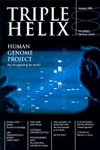Discriminatory diplomacy?
Doctors who have a conscientious objection to prescribing post-coital contraception or IUCDs that act after fertilisation will no longer be able to obtain the Diploma of the Faculty of Family Planning (DFFP) of the Royal College of Obstetricians and Gynaecologists. According to the College's October 1999 Guidelines, while 'doctors who hold moral or religious reservations about any contraceptive method are very welcome to undertake the training', they will not be eligible for adiploma if they 'restrict (their) repertoire of methods'. Whilst the absence of a diploma does not yet disqualify a doctor from giving contraceptive advice, it seems that job discrimination against Christian doctors who hold conservative ethical views is now inevitable.
Supernatural remedies?
'The Lord created medicines from the earth, and a sensible man will not despise them' (Sirach 38:4) Evidence is now emerging from systematic reviews and meta-analyses of randomised trials that some herbal medicines are efficacious. Recent examples include St John's wort for depression, ginkgo for dementia, palmetto for benign prostatic hyperplasia and horse chestnut seed for chronic venous insufficiency. Past examples, of course, include aspirin (willow bark), digitalis (foxglove) and morphine (poppies). Obviously the natural ingredient does need to be clearly identified and given in the right dose! (British Medical Journal 2000; 321:394-5, 12 August)
A fate worse than debt?
The United States has offered sub-Saharan Africa a $1billion loan programme to buy anti-AIDS drugs. The offer has been condemned by Oxfam as 'a debt tomorrow's AIDS orphans will be forced to pay'. The US offer requires countries to buy drugs manufactured in the United States. Oxfam accused the US of setting up a deal to help drug companies fight off competition from generic drugs that can be manufactured locally at a fraction of the cost. 24.5 million people in sub-Saharan Africa are currently infected with HIV. (British Medical Journal 2000; 321:260, 29 July)
Killing the pain, not the patient
A Lancet study of 238 patients at St Christopher's Hospice has concluded that the use of opiates does not shorten the lives of terminally ill patients. Those who received markedly increased doses in the last week of life did not have shorter survival periods than those who received no increases. Researcher Nigel Sykes observed: 'This study dispels the myth that good pain control at the end of life means killing the patient. People should not fear that taking morphine for pain need shorten life... There is no connection between competent symptom control and euthanasia.' (reported in SPUC News Digest 2000; 3 August)
Telediagnosis for the developing world
In sub-Saharan Africa there are on average less than 10 doctors per 100,000 people - but now 53 out of 54 African countries have email access - and SatelLife, a Boston-based charity now provides email access in 140 countries serving 10,000 healthcare workers by using low earth orbit satellites and phone lines. With the falling costs and increasing capabilities of computers and imaging systems, a basic store-and-forward telemedicine system (using email, PC and digital camera) can now be set up for little more than $1,000. (British Medical Journal 2000; 321:465-6, 19 August)
Persistent vegetative state...not
There are about 1,500 patients in the United Kingdom who are thought to have been in a vegetative state for more than three months. However, over 40% of them may have been wrongly diagnosed according to research originally published in 1996. A technique developed at the Royal Hospital for Neuro-Disability in London is now able to identify the slow-to-recover patients, and should be available to other hospitals by the end of the year. SMART (sensory modality assessment and rehabilitation technique) records patients' responses to stimulation over two weeks, enabling those who communicate in a consistent and meaningful way to be picked up, and managed more effectively. (British Medical Journal 2000; 321:196, 22 July)
'Do not resuscitate' policies
In early September the Department of Health ordered NHS trusts in England to draw up 'do not resuscitate' policies. The proposal first appeared in the NHS Plan in July and follows similar recommendations by the British Medical Association. This is a great opportunity for CMF members to make a contribution - by making use of the guidance published in the July edition of Triple Helix. (British Medical Journal 2000; 321:588, 9 September)
Getting the point
The British Medical Association has urged the NHS to make acupuncture more widely available, saying that the vast majority of doctors believe that it works. The BMA is recommending that training is made more widely available. It has also called on the National Institute for Clinical Excellence (NICE) to issue guidelines on the use of acupuncture in the health service. Family doctors traditionally have regarded alternative medicine with scepticism but a BMA survey found that 58% had arranged some sort of complementary or alternative treatment. Of these acupuncture was the most popular. (Telegraph 2000; 26 June)
Folic follies
It is almost a decade since it was discovered that folic acid could prevent the development of neural tube defects such as spina bifida. The United States acted on the research four years ago by fortifying flour with folic acid, but it has taken until July this year for the UK Department of Health to launch its own three month consultation with the same end in mind. Thankfully now the move doesn't look far off. The main result will be in curbing the growing number of mid-trimester abortions for spina bifida. If only the government had the same enthusiasm for preventing disability as it does for prenatal diagnosis and abortion! (British Medical Journal 2000; 321:400,12 August)































